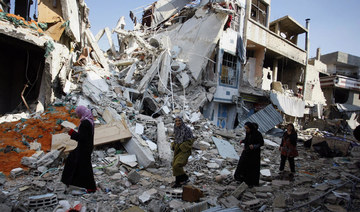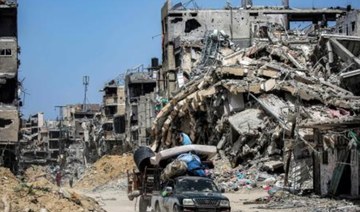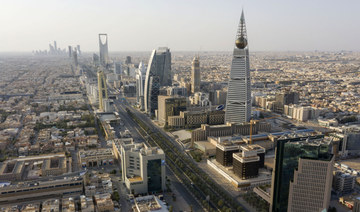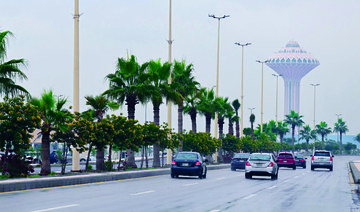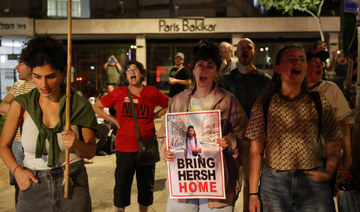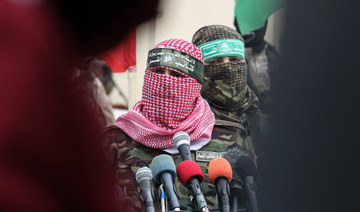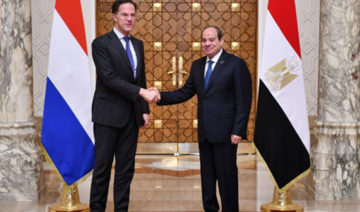BAGHOUZ, Syria: War is personal. And in Syria, after eight years of a grinding conflict, there are as many stories of loss, dispossession and desperate hope as there are people.
What started as peaceful protests in 2011 asking for government change turned into one of the cruelest modern wars and left a trail of broken lives among the country’s pre-war population of 23 million. Now half are displaced, nearly half a million dead and many live with permanent scars or have joined militias.
The years of war have left their mark on Dia Hassakeh’s 45-year old face. The Arab fighter in the Kurdish-led U.S-backed Syrian Democratic Forces has seen his family suffer on the conflict’s many fronts.
In the early days of the conflict, two of his brothers were wounded fighting in the government military against the armed opposition. In November, another brother was killed by the Daesh group. Now Dia is battling the militants at Daesh’ last holdout, a speck of territory along the Euphrates River near the Iraqi border called Baghouz.
“As Syrians, every citizen has paid the price,” he said, speaking just outside Baghouz. He took the name of his hometown Hassakeh as a nom de guerre when he joined the SDF.
While the Daesh group’s territorial defeat will close one bloody chapter, Syria is still wracked by conflict on the eighth anniversary of its long-running civil war.
Syrian President Bashar Assad’s government appears to have won the war against the insurgency trying to topple him. But much of the country is out of Assad’s hands. The northeast and east, wrested from Daesh, is largely held by the US-backed Kurdish-led forces. But their fate as well is uncertain. Though President Donald Trump announced he would withdraw American troops, the US is apparently keeping a small force, hoping to encourage the Europeans to strengthen their presence to protect its Kurdish allies from their nemesis Turkey, and counter Iran’s expansion in the region.
Militants are still a potent force. The Daesh group has planted the seeds to wage an insurgency. The northwestern province of Idlib — an opposition stronghold throughout the war — is home to other jihadists as radical as Daesh. Nearly 3 million Syrians live in the province, most displaced from other parts of Syria that fell under government control. A Turkish-Russian truce that averted a government assault on Idlib and took pressure off Assad is fraying, threatening new bloodshed.
Assad remains hostage to his massive need for cash to rebuild and his reliance on his allies, Russia and Iran, which are pursuing their own interests. Moscow wants to keep access to the Mediterranean and a position to challenge the West; Tehran is keeping an array of militias in Syria to preserve its domain of influence stretching from Iraq to Lebanon.
And public opposition is not extinguished.
Like Groundhog Day, protesters in southern Syria took to the streets of Daraa, the city where the 2011 anti-government rallies first erupted and where the government only finally managed to re-establish control last year. Men and children this month held day and night protests chanting against Assad after authorities planned to erect a statute for his late father.
“The people want a new president,” protesters chanted, a 2019 version of “the people want to bring down the regime.”
Within this maze of conflicts, players and interests, Syrians try to find their way.
Dia never liked the anti-government protests. When they erupted in 2011, he left Hassakeh — in the northeast of Syria — to live in northern Iraq. There, while two of his brothers fought in the military against the rebels, he ran a home appliances business and sat out the war — until the war caught up with him unexpectedly. The Daesh group, feeding off Syria’s chaos, swept over much of Syria and northern Iraq. Dia returned to Hassakeh and found the militants closing in on his home province.
He volunteered to fight against them to “protect our family, land and country,” he said.
He blames outsiders— militants and superpowers — for breaking up his country. Having fought in the SDF and served in his own government’s army before the revolts, he still believes the country will be put back together and heal.
“Any country that goes through this needs time.”
The irony is he is fighting in a force backed by a foreign power — the US — and led by Kurds determined to stay as separate as possible.
Sefqan, a 29-year old Kurd who commands an SDF unit of more than 200 special forces fighters, has no issues with his country breaking up and the central government losing authority.
“The Baath regime is no good for us Kurds,” he said, referring to Assad’s ruling party. “Our rights were lost in Syria ... Our war is to get out from under of this injustice.” Sefqan fought against Daesh and prior to that other jihadist groups who threatened his hometown, Amuda, in Hassakeh province.
Kurds, who made of 10 percent of Syria’s pre-war population, have long complained of discrimination and oppression by Damascus. Sefqan belongs to an even more disenfranchised community — he’s one of thousands of Kurds who are stateless, because in the past they either failed to convince authorities they were Syrian residents or didn’t take part in censuses in the 1960s and 1970s. Referred to as the “foreigners of Hassakeh,” “the muted” or “the concealed,” they were long deprived of basic rights like education and health services and were barred even from moving from province to province.
“Any group has a state. Why do we the Kurds not have one? To go to schools. To speak our language. To have an airport and travel. I can’t even go to Damascus,” said Sefqan, who spoke on condition he be identified only by his first name in accordance with SDF rules for its commanders.
Now Sefqan and many of his people enjoy new found confidence and clout, with the Kurdish-led administration controlling northeastern Syria and bolstered by natural resources and good relations with the U.S-led coalition.
Sefqan and other Kurds dream of emulating the extensive autonomy enjoyed by Iraq’s northern Kurdistan. He said the Kurdish-led administration has made strides in giving real representation to the community and praised its efforts to introduce democracy.
“If they continue this, it will be good,” he said — though with a note of wariness. Rights groups blame the SDF and the administration for arbitrarily detaining critics, forcing military conscription and controlling what are meant to be representative political bodies.
The SDF has emerged as the most organized non-state actor from the war. It and its political arm have successfully established facts on the ground that will likely be hard to reverse — such as teaching the Kurdish language in schools and setting up parallel governing institutions and their own economic infrastructure.
Ali Ahmed Al-Hassan, a 29-year-old Arab, works trucking crude oil from one of the richest oil fields controlled by the SDF. It is a profitable, but highly risky business, because remnants of Daesh have threatened those helping the “Kurdish economy.”
Al-Hassan lived for four years under Daesh rule after the militants took over his home province of Deir Ezzor. Two of his brothers died, one as a bystander when airstrikes hit an Daesh position and another when he was caught in a cross fire.
“No one has been spared. My two brothers. My two nephews. And about six cousins. All were killed in the war,” he said.
Deir Ezzor has been freed of Daesh, but it’s still insecure. He has to be home before dark because of IS sleeper cells lurking in the countryside.
“We need more than a year” to regain security, he said.
Daesh has left its mark. The locals “have become foreigners. Many of the (foreign militants) married locals. Our children have become Chinese,” he said — his term for the many Central Asian fighters who joined Daesh in Syria.
Dia believes the militants’ presence is a pretext for foreign powers to meddle in Syria.
“Everyone is responsible for the creation of Daesh,” he said. “It was created and put on a pedestal to ruin this country, like the Arab spring. “
“All my family has taken part in this war. Five of us. Two were injured — one lost a leg, and another carries a cane — and one was killed. There is only me and another left,” he said. “So long as we have life and our hearts are beating, we will fight to liberate this country.”
For Syrians, 8 years of war leaves stories of loss and hope
For Syrians, 8 years of war leaves stories of loss and hope
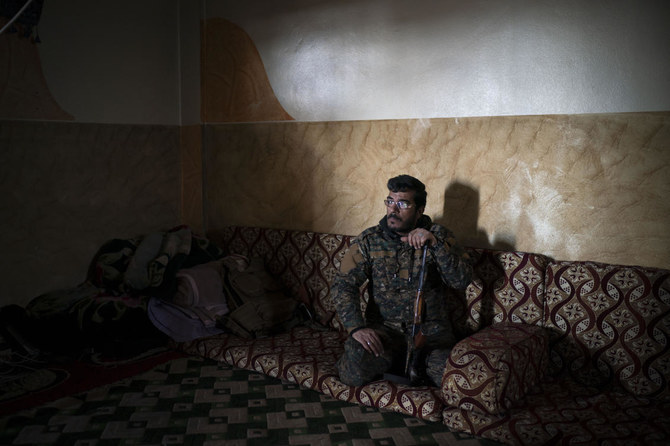
- What started as peaceful protests in 2011 asking for government change turned into one of the cruelest modern wars
- The war left a trail of broken lives among the country’s pre-war population of 23 million
Egypt sending ceasefire delegation to Israel
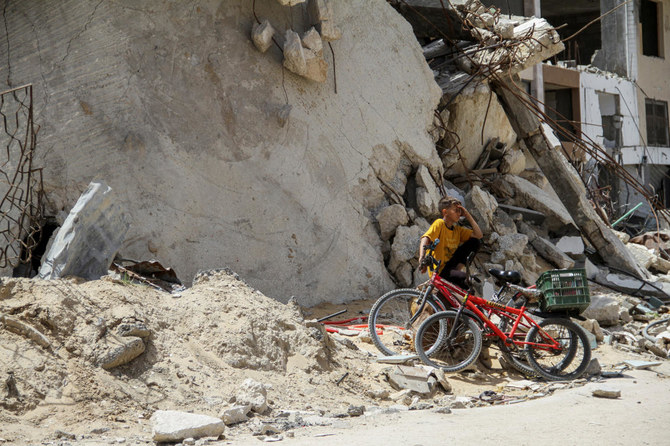
- Egyptian intelligence chief Abbas Kamel plans to make clear that Egypt ‘will not tolerate’ Israel’s deployments of troops along Gaza’s borders with Egypt
Egypt is sending a high-level delegation to Israel in the hope of reaching a ceasefire agreement with Hamas in Gaza, while warning a possible new Israeli offensive focused on the southern city of Rafah on the border with Egypt could have catastrophic consequences for regional stability, two officials said Friday.
While in Israel, Egyptian intelligence chief Abbas Kamel plans to make clear that Egypt “will not tolerate” Israel’s deployments of troops along Gaza’s borders with Egypt, an Egyptian official said, speaking on condition of anonymity to freely discuss the mission.
Earlier Friday, Lebanon’s militant Hezbollah group fired anti-tank missiles and artillery shells at an Israeli military convoy in a disputed area along the border, killing an Israeli civilian, the group and Israel’s military.
Hezbollah said that its fighters ambushed the convoy shortly before midnight Thursday, destroying two vehicles. The Israeli military said the ambush wounded an Israeli civilian doing infrastructure work, and that he later died of his wounds.
Low-intensity fighting along the Israel-Lebanon border has repeatedly threatened to boil over as Israel has targeted senior Hezbollah militants in recent months.
Tens of thousands of people have been displaced on both sides of the border. On the Israeli side, the cross-border fighting has killed 10 civilians and 12 soldiers, while in Lebanon, more than 350 people have been killed, including 50 civilians and 271 Hezbollah members.
On Thursday, Palestinian hospital officials said Israeli airstrikes on the southern city of Rafah in the Gaza Strip killed at least five people.
More than half of the territory’s population of 2.3 million have sought refuge in Rafah, where Israel has conducted near-daily raids as it prepares for an offensive in the city. The Israeli military has massed dozens of tanks and armored vehicles in the area in what appears to be preparations for an invasion of Rafah.
In central Gaza, four people were killed in Israeli tank shelling.
A ship traveling in the Gulf of Aden came under attack Thursday, officials said, the latest assault likely carried out by Yemen’s Houthi rebels over the Israel-Hamas war.
Meanwhile, a top Hamas political official said that the Islamic militant group is willing to agree to a truce of five years or more with Israel.
The Israel-Hamas war was sparked by the unprecedented Oct. 7 raid into southern Israel in which militants killed around 1,200 people, mostly civilians, and abducted around 250 hostages. Israel says the militants are still holding around 100 hostages and the remains of more than 30 others.
The war has killed more than 34,000 Palestinians, according to local health officials, around two-thirds of them children and women.
Sheikh Mansour bin Zayed receives Saudi envoy in Abu Dhabi
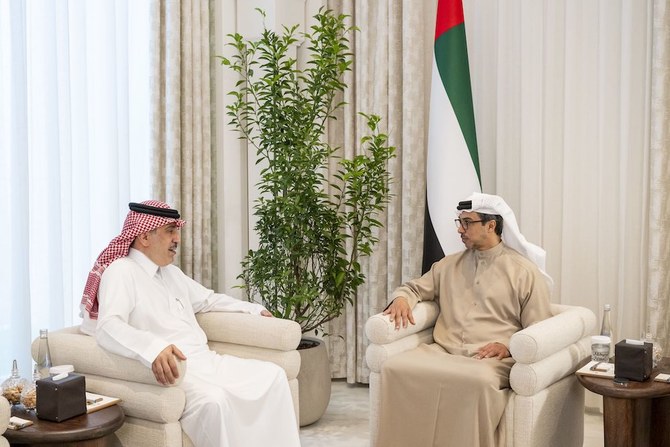
DUBAI: Sheikh Mansour bin Zayed Al-Nahyan, Vice President, Deputy Prime Minister and Chairman of the Presidential Court, has received Sultan bin Abdullah Al-Anqari, Saudi Arabia’s ambassador to the UAE.
During a meeting at Qasr Al-Shati in Abu Dhabi, the two officials discussed relations between the two countries and ways to enhance cooperation that would be beneficial to both nations, state news agency WAM said.
Sheikh Mansour emphasized the robust ties between the UAE and Saudi Arabia are underpinned by the leadership of both countries.
US military starts pier construction off Gaza

- But humanitarian aid coming off the pier will need to pass through Israeli checkpoints on land
- Despite the aid having already been inspected by Israel in Cyprus prior to being shipped to Gaza
WASHINGTON: US troops have begun construction of a maritime pier off the coast of Gaza that aims to speed the flow of humanitarian aid into the enclave when it becomes operational in May, the Pentagon said on Thursday.
President Joe Biden announced the pier in March as aid officials implored Israel to ease access for relief supplies into Gaza over land routes. Whether the pier will ultimately succeed in boosting humanitarian aid is unclear, as international officials warn of the risk of famine in northern Gaza.
Israel’s six-month-long military campaign against Hamas has devastated the tiny Gaza Strip and plunged its 2.3 million people into a humanitarian catastrophe.
A senior Biden administration official, speaking to reporters on condition of anonymity, said humanitarian aid coming off the pier will need to pass through Israeli checkpoints on land. That is despite the aid having already been inspected by Israel in Cyprus prior to being shipped to Gaza. Israel wants to prevent any aid getting to Hamas fighters that boosts their war effort.

The prospect of checkpoints raises questions about possible delays even after aid reaches shore. The United Nations has long complained of obstacles to getting aid in and distributing it throughout Gaza.
“I can confirm that US military vessels, to include the USNS Benavidez, have begun to construct the initial stages of the temporary pier and causeway at sea,” Pentagon spokesperson Major General Patrick Ryder told reporters.
Concerns about the risk to American troops getting caught up in the Israel-Hamas war were underscored on Thursday as news emerged of a mortar attack near the area where the pier will eventually touch ground. No US forces were present, however, and Biden has ordered US forces to not step foot on the Gaza shore.
The pier will initially handle 90 trucks a day, but that number could go up to 150 trucks daily when it is fully operational. The United Nations said this week that the daily average number of trucks entering Gaza during April was 200 and that there had been a peak on Monday of 316.
The official added that about 1,000 US troops would support the military effort, including in coordination cells in Cyprus and Israel.
A third party will be driving trucks down the pier onto the beach, the official added.
The northern Gaza Strip is still heading toward a famine, the deputy UN food chief said on Thursday, appealing for a greater volume of aid and for Israel to allow direct access from its southern Ashdod port to the Erez crossing.
In a statement, the Israeli military said it would provide security and logistics support for the pier.
An Israeli military brigade, which includes thousands of soldiers, along with Israeli Navy ships and Air Force would work to protect US troops who are setting up the pier.
Ryder said the Pentagon was tracking some type of mortar attack in Gaza that caused minimal damage in the marshalling area for the pier. But he added that US forces had not started moving anything to that area yet and there were no US forces on the ground.
Hamas official says Israel ‘will not achieve’ goals in Rafah
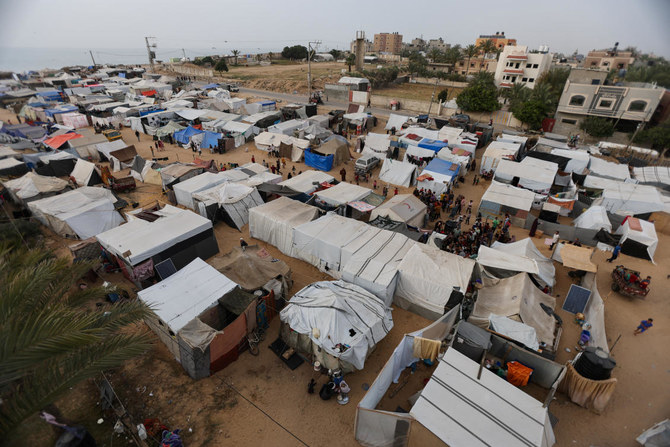
- “Even if (Israel) enters and invades Rafah, it will not achieve what it wants,” Ghazi Hamad said
- “This will undoubtedly threaten the negotiations because it is clear from this declared position that Israel is interested in continuing the war“
GAZA STRIP, Palestinian Territories: A senior Hamas official told AFP on Thursday that Israel would fail to meet its stated goals of defeating the Palestinian militant group and freeing hostages by invading the southern Gaza city Rafah.
“Even if (Israel) enters and invades Rafah, it will not achieve what it wants,” Ghazi Hamad said in an interview over the phone from Qatar, where a number of senior figures from Hamas’s political bureau are based.
Hamad said Israel had “spent nearly seven months in Gaza and invaded all areas and destroyed a lot, but so far has not been able to achieve anything of its main goals, whether eliminating Hamas or returning the captives.”
Israel has vowed to move on with the planned military operation in Rafah, despite international outcry and concern for about 1.5 million Palestinians sheltering in the city.
There are fears of huge civilian casualties and countries including Israel’s top ally and weapons supplier the United States have warned Israel against sending troops into Rafah.
“We have spoken with all parties involved in the conflict... about the seriousness of invading Rafah and that Israel is heading toward committing additional massacres and additional genocide,” Hamad said.
“This will undoubtedly threaten the negotiations because it is clear from this declared position that Israel is interested in continuing the war and aggression and has no intention of continuing negotiations and reaching an agreement,” he said.
Qatar, the United States and Egypt, have been mediating talks to secure a truce and the release of hostages, but those have stalled for days.
An Egyptian delegation is however set to travel to Israel on Friday to kickstart a new round of talks, Israeli media reported citing unnamed officials.
Israeli government spokesman David Mencer said Israel’s war cabinet was meeting Thursday “to discuss how to destroy the last battalions of Hamas.”
On Wednesday, Mencer said that since Israel began its ground invasion of Gaza on October 27, the army has destroyed “at least 18 or 19 of Hamas’s 24 battalions.”
Officials say the remaining battalions are in Rafah — the main target of the impending assault.
Most Gazans taking refuge in Rafah are sheltering in makeshift camps, and even before the start of the expected ground invasion, the city near the Egyptian border has been suffering regular Israeli bombings.
Hamad argued the planned invasion was exposing contradictions in Israeli Prime Minister Benjamin Netanyahu’s stance on Gaza.
“Netanyahu is stumbling because, on the one hand, he wants to return the captives to their families, as he says, but at the same time, he puts them in great danger, as his army deliberately killed many hostages.”
Israel’s army has admitted to mistakenly killing some hostages in Gaza.
Hamad accused Netanyahu of “manipulating and procrastinating” in a bid to “deceive the Israeli public that there are negotiations and deceive the international community as well that there are negotiations.”
He said the Israeli prime minister was “trying to twist the truth” and claim that “Hamas is the obstacle in these negotiations.”
Hamad said Qatar and Egypt were “making great efforts to reach an agreement,” but argued “the Israeli side unfortunately deals with the matter foolishly and is very confused.”
Hamad also told AFP that Hamas, which took power in Gaza in 2007, was already working on plans for the territory after the war.
He said the group was “working on the post-war phase to ensure that there is a great effort to rebuild the Gaza Strip and provide the necessities for a decent life.”
Palestinian militants took around 250 hostages to Gaza during Hamas’s October 7 attack that triggered the war.
Israeli officials say 129 hostages are still held in Gaza, including 34 the military says are dead.
The attack on southern Israel resulted in the deaths of 1,170 people, Israelis and foreigners, according to an AFP tally based on official Israeli figures.
Israel’s retaliatory offensive against Hamas in Gaza has killed 34,305 people, most of them women and children, according to the territory’s health ministry.
Shawarma restaurant in Cairo brings taste of home for displaced Palestinians
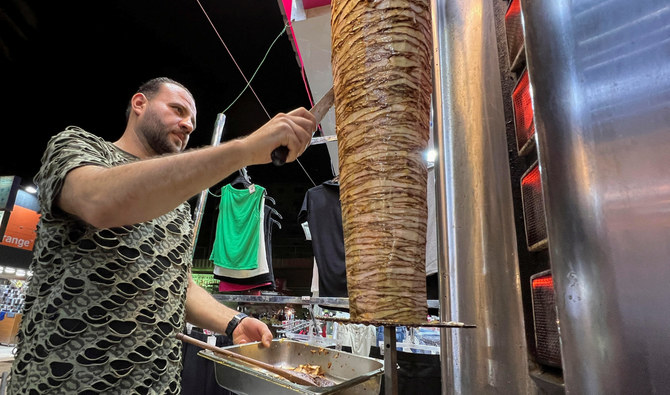
CAIRO: A Palestinian businessman displaced by the war in Gaza is bringing a taste of home for fellow refugees with a shawarma restaurant he has opened in Cairo.
“The Restaurant of Rimal Neighborhood” offers shawarma, a Middle Eastern dish of thinly sliced meat, and other Palestinian and Arab dishes.
“The name comes to eternalize Rimal, my neighborhood, and my homeland too,” said Basem Abu Al-Awn.
“It is also to replace the restaurant I once had in Gaza. Two restaurants of mine, in addition to my house and the houses of my relatives, were destroyed,” he said.
Abu Al-Awn hopes his time outside Gaza will be temporary, and he is determined to return to the enclave once the war between Israel and Hamas is over.
“I will return, even if I have to set up a tent near the rubble of my house. We are going back to Gaza, and we will rebuild it,” he said.
Rimal was Gaza City’s busiest shopping center, with large malls and main bank offices before Israeli forces reduced most of it to rubble.
It was also home to Gaza’s most famous shawarma places.
“The taste is the same. People tell us it tastes as if they are eating it in Gaza,” said Ahmed Awad, the new restaurant’s manager.
“The Egyptians who get to try our place keep coming back. They tell us the taste is nice and is different from the shawarma they usually get,” Awad said.
Gaza shawarma spices are unique and scarce in Cairo, so credit goes to Awad’s father, who mixes those available to give the dish a special Palestinian taste.
Many thousands of Palestinians have arrived in Gaza since the war began last October.
Awad, his wife, and four children arrived in Cairo three months ago.
In Gaza, he used to work in restaurants specializing in oriental and Western dishes.
With an end to the war looking like a distant prospect, Awad urged Palestinians not to give up.
“I advise them to work and take care of their lives. Their houses and everything may have gone, but no problem; it will come back again,” he said.
“Once things are resolved, we will return home, work there, and rebuild our country.”
Palestinians now stranded in Cairo include businessmen, students, and ordinary families who say they seek temporary legal residency to pursue investment and study plans until a ceasefire is in place.
Om Moaz, from Rafah in the southern Gaza Strip, had been struggling to pay for a rented house and treatment for her husband and daughter in Cairo. She began working from home, offering Palestinian food through social media.
She found there was a strong demand from both Egyptians and Palestinians.
“Some were in the war and came to Egypt. So they started ordering my food. And thank God, it’s a successful business, and hopefully, it continues,” she said.



